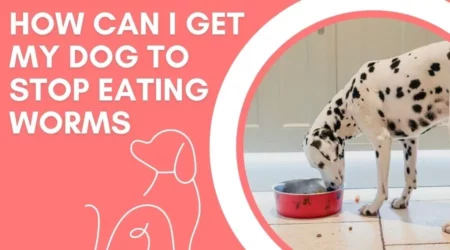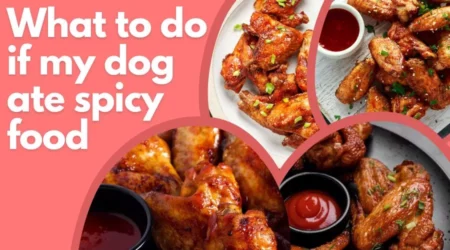Chicken bones are an excellent source of protein, minerals and vitamins.
There are some risks associated with feeding your dog chicken bones. While chicken is generally much safer for dogs to eat than raw pork or beef bones, they can still pose a risk if not carefully monitored.
Vets advise against giving your dog raw steak or chicken bones because they could splinter and cause damage to the dog’s digestive tract when digested.
Raw bones also don’t contain much calcium or other essential nutrients so aren’t considered beneficial for your dog.
If you want to feed your dog a chicken bone, make sure to handle it first yourself and follow these safety tips below:
Tips On How To Feed Your Dog Cooked Chicken Bones Safely
If you’ve determined that cooked chicken bones are safe to feed your dog, it’s important to follow these tips to keep your dog safe and healthy.
- Select large chicken bones that are at least an inch wide and no longer than two inches.
- Cook the chicken bones until they’re soft enough to be chewed easily.
- Cut the chicken bones into smaller pieces.
- Monitor your dog when he’s chewing on the chicken bones.
- Make sure to remove any pieces of chicken bones that break off or fall on the floor.
- Wash your dog’s hands after he chews on the chicken bones to remove any residue.
Steps To Take Immediately
If your dog eats chicken bones, there are a few steps you should take immediately:
How To Safely Feed Your Dog A Chicken Bone?
The first step to safely feeding your dog a chicken bone is to make sure it’s cooked. Raw bones are brittle and can easily splinter and break into shards that can damage your dog’s digestive tract when digested. Cooked bones,
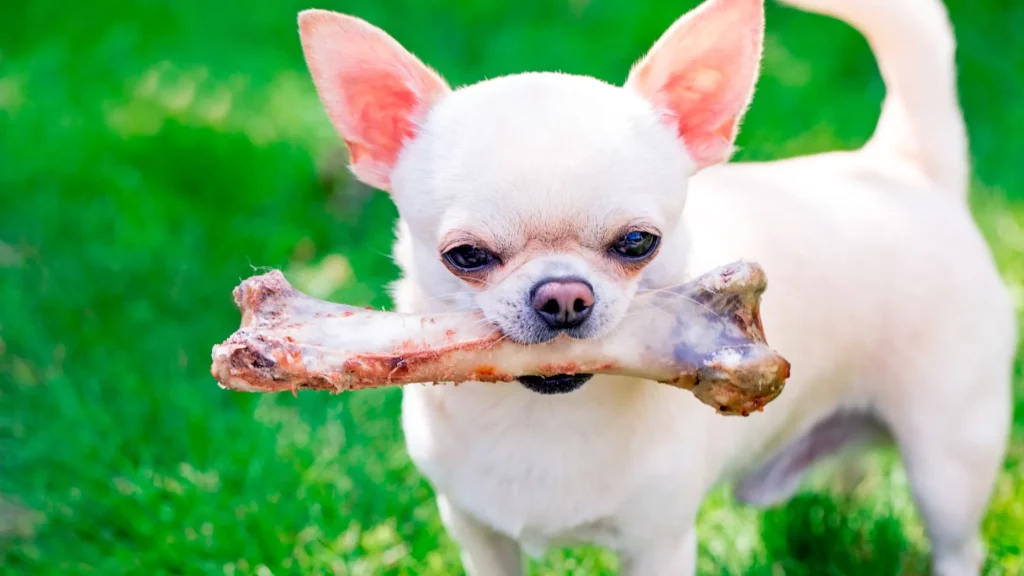
In addition to being cooked, the chicken bone should also be large enough to prevent your dog from choking or getting a bone stuck in his throat or stomach.
The best bone size for a dog is an inch or more in width and no longer than two inches. Any larger bone pieces can accidentally be swallowed whole, which can cause blockages and other digestive issues.
How To Identify A Safe Chicken Bone For A Dog?
If you’re considering feeding a chicken bone to your dog, it’s important to know if it’s safe.
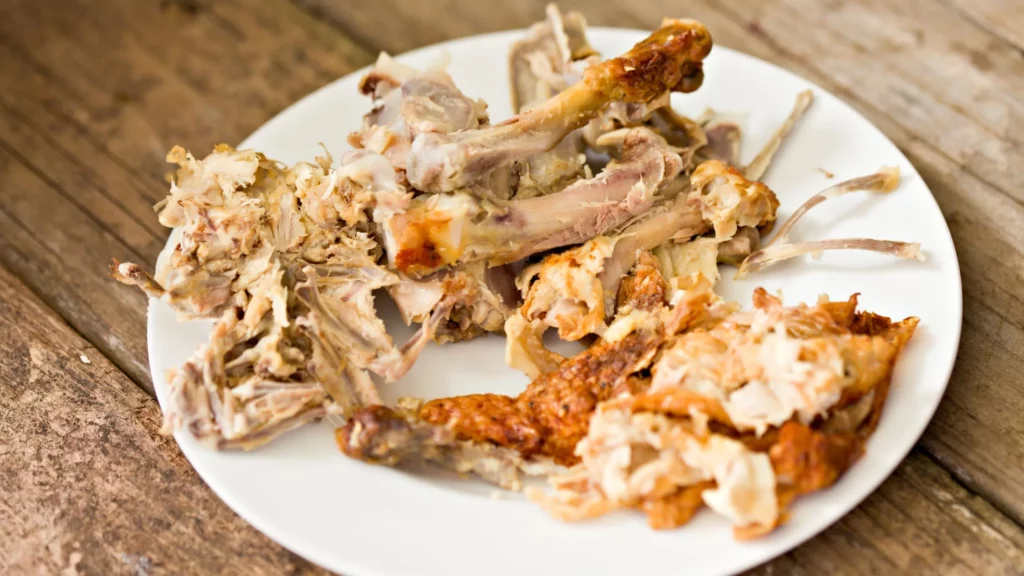
Some bones are too brittle to be safe for a dog. Some bones might have a coating on them that is unsafe to eat.
In addition, some bones are too small to be safe for a dog to eat. Safe bones for dogs to eat include: – Chicken bones – As long as they’re cooked.
What Happens If A Dog Eats A Chicken Bone?
While chicken bones are generally safe for dogs to eat, they can be a choking hazard if they’re not cut into smaller pieces first.
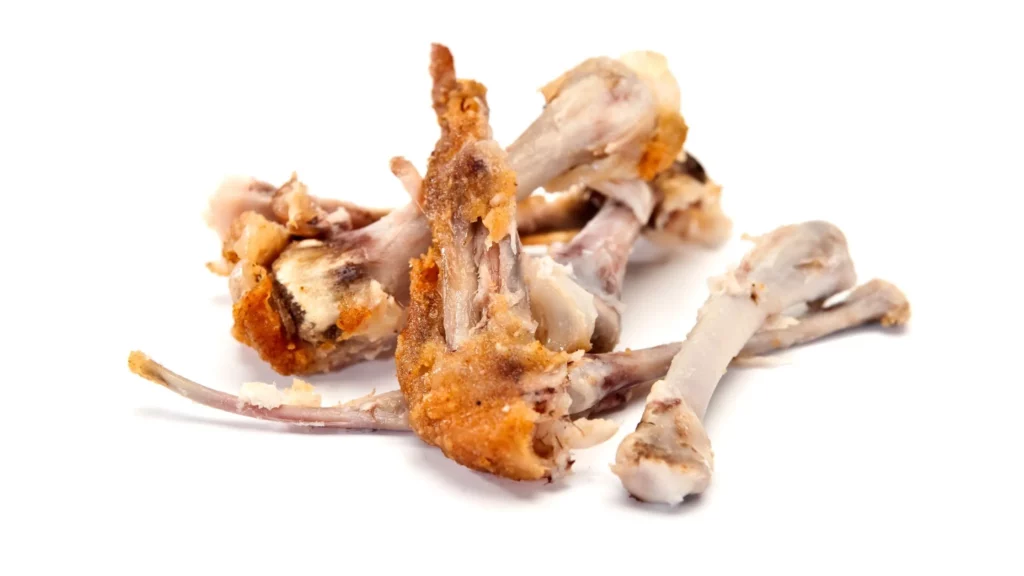
Chicken bones also don’t contain much calcium or other essential nutrients, so aren’t considered beneficial for your dog.
If you want to feed your dog a chicken bone, it’s important to know if it has been processed to remove the risk of splintering.
If you’re unsure, it’s best to skip the chicken bone and choose another type of edible chew toy instead.
What Happens If A Dog Eats A Chicken Bone?
A dog who eats a chicken bone will typically consume the meat first, then the bone. The bone will be softened and squishy enough to pass through the dog’s digestive tract without any issues. If the bone isn’t cooked enough,
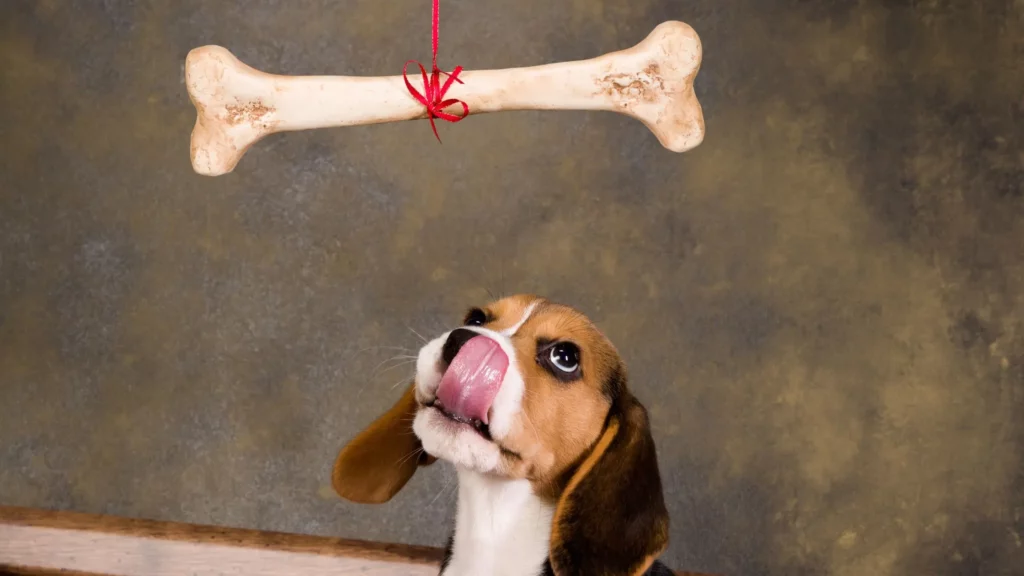
it can be brittle enough to splinter and damage your dog’s digestive tract. This can lead to intestinal blockages, perforation, blood in the dog’s stool, vomiting, diarrhea, and other issues.
If your dog ingests a large chicken bone and it becomes lodged in his throat or stomach, the bone can cause damage and bleeding.
The Risks Of Feeding Your Dog Chicken Bones
The biggest risk associated with feeding your dog chicken bones is that they can cause intestinal blockages and intestinal perforation.
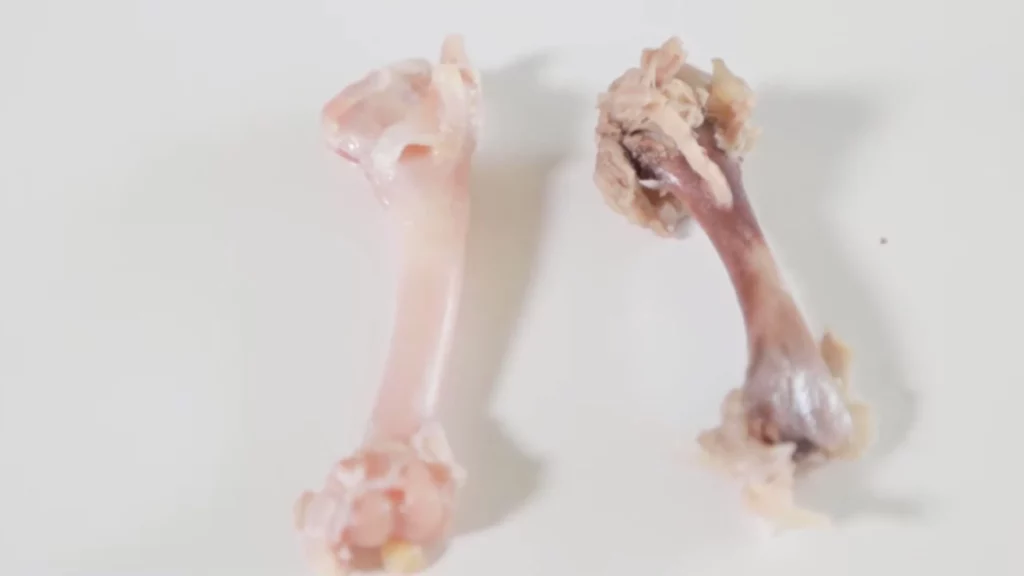
This can be a deadly risk and requires immediate veterinary care. Other risks include vomiting, diarrhea and blood in the dog’s stool.
If your dog ingests a large chicken bone and it becomes lodged in his throat or stomach, the bone can cause damage and bleeding.
When It’s Not Safe For Dogs To Eat Chicken Bones
If your dog has a medical condition, such as gastric or intestinal ulcers, inflammatory bowel disease or hemophilia, it’s not safe for him to digest chicken bones.
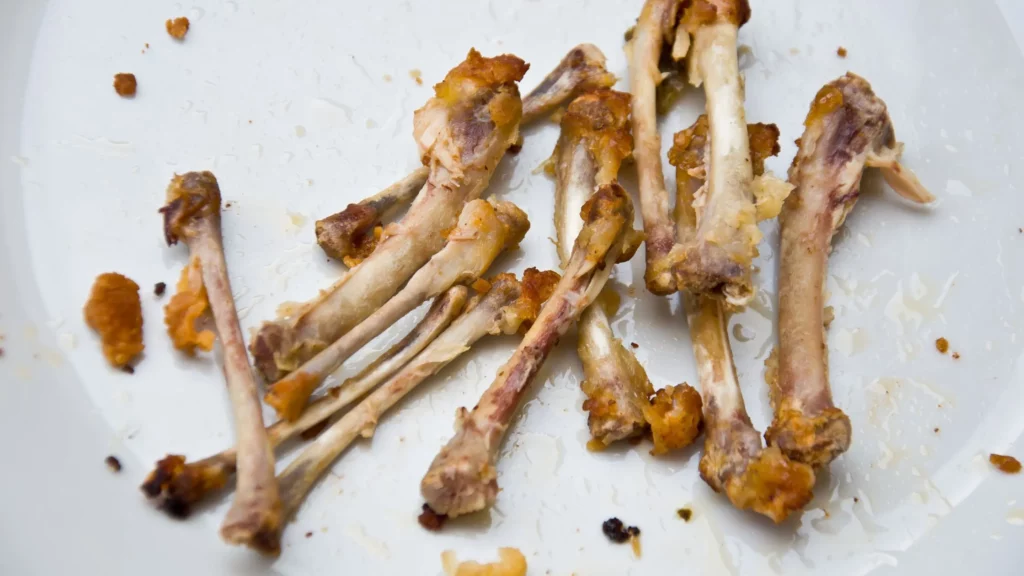
If you’re unsure if it’s safe for your dog to eat chicken bones, it’s best to skip them and choose another type of edible chewing toy.
Dogs who are unsupervised should also avoid eating chicken bones. If your dog ingests a chicken bone, it’s important to try to get it out. If the dog cannot pass the bone in his stool, you’ll need to take him to the vet to have it removed.
How To Properly Handle And Give Cooked Chicken Bones To Dogs
When you feed your dog chicken bones, you should always handle them with clean hands to prevent contamination.
If the bones are large enough for your dog to pick them up and chew on them without you holding them, make sure to use a clean dog bone feeder or dish to hold the bones.
It’s also important to monitor your dog while he’s chewing on a chicken bone to make sure no pieces are falling on the floor or getting stuck in his paws.
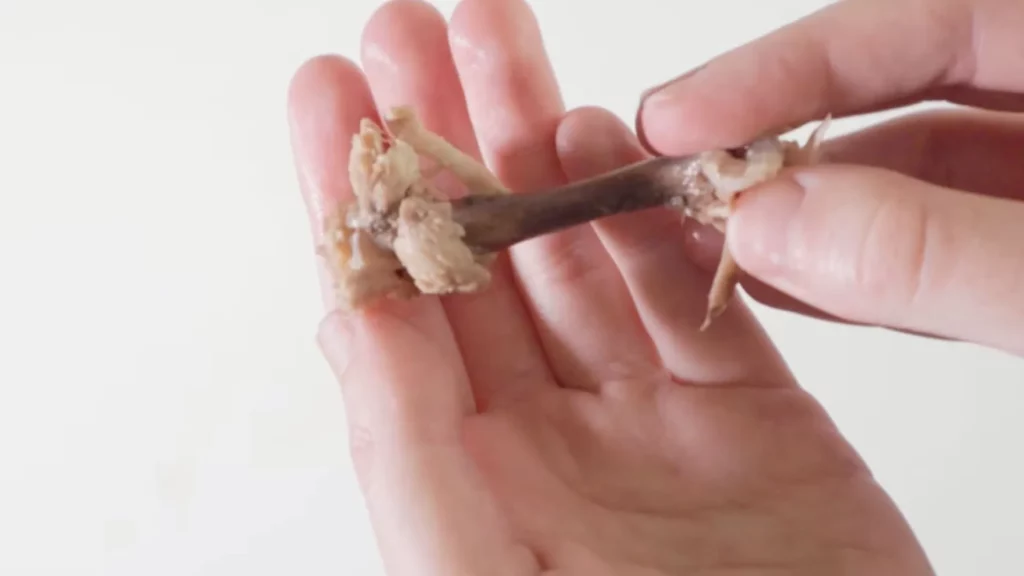
If a piece of chicken bone breaks off and gets stuck in your dog’s paws or mouth, you’ll need to remove it promptly to avoid any damage.
Why are Chicken Bones Dangerous for Dogs?
Chicken bones are dangerous for dogs because they can splinter and cause internal damage or blockages.
Dogs typically do not chew their food as thoroughly as we do, so they are more likely to swallow chicken bones whole.
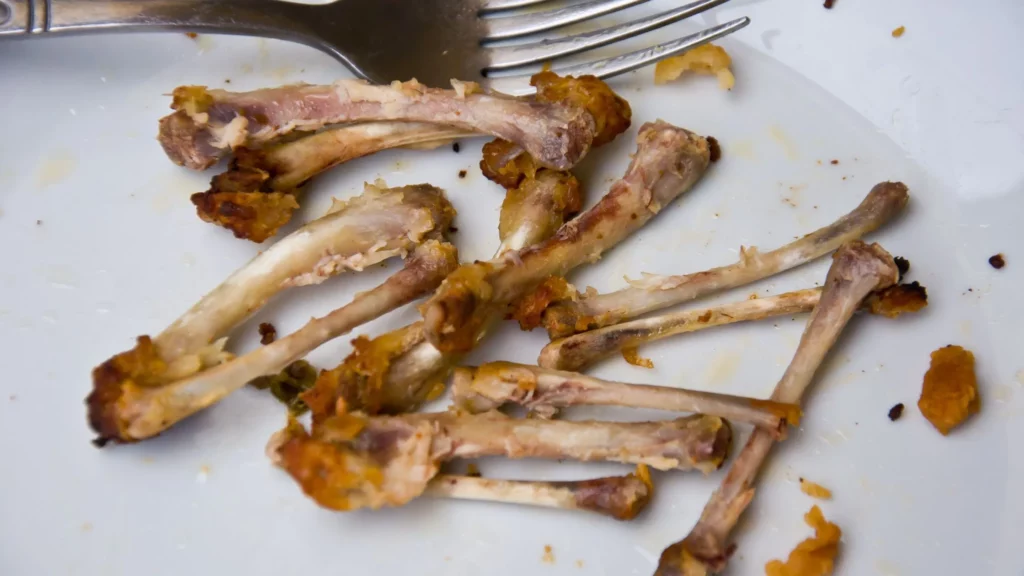
Once swallowed, the sharp edges of the bones can cut or scrape the lining of the digestive tract, causing pain, bleeding, infection, or other serious problems.
In some cases, chicken bones can even puncture the stomach or intestines, leading to life-threatening complications.
What Should You Do if Your Dog Grabs Chicken Bones?
If your dog grabs chicken bones, you should immediately remove the bone from their mouth and dispose of it.
Chicken bones can splinter and cause serious injuries to your dog’s mouth, throat, and digestive tract.
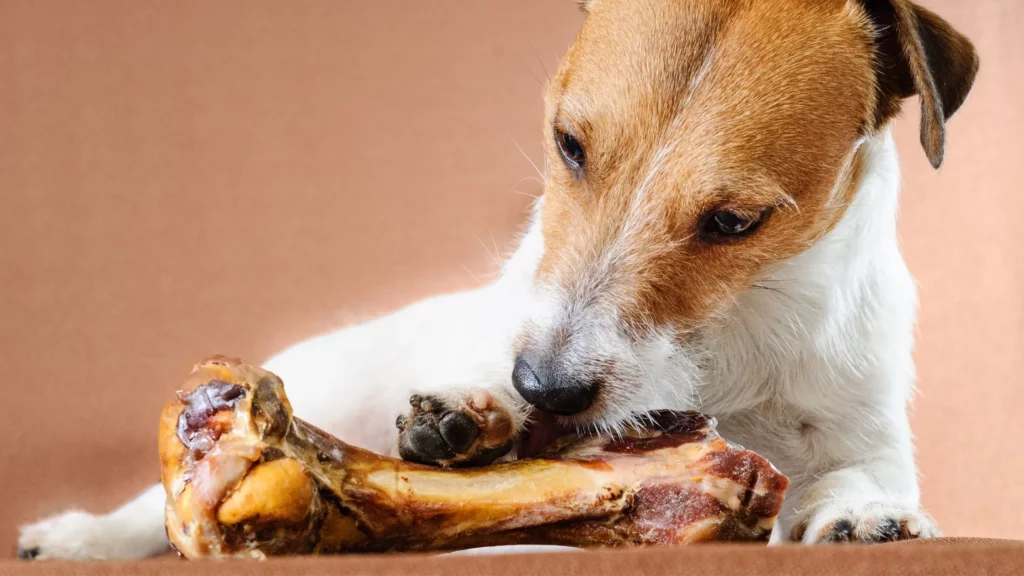
If your dog has already swallowed a chicken bone, watch for signs of choking or obstruction, such as drooling, pawing at the mouth, gagging, or vomiting. If your dog is showing any of these signs, take them to the vet immediately.
What Should You Look for in the Coming Hours if Your Dog Ate Chicken Bones?
If your dog ate chicken bones, you should look for the following signs and symptoms in the coming hours:
If your dog exhibits any of these signs or symptoms, it is important to bring them to the vet as soon as possible as they could be indicative of a more serious condition.
When Should You Go to the Emergency Vet if Your Dog Ate Chicken Bones?
If your dog has eaten chicken bones, it is important to monitor them closely and seek professional medical help if they start to show any signs of distress.
While some dogs may be able to pass the bones without any problems, others may experience serious gastrointestinal issues that can lead to obstruction or perforation.
If your dog starts vomiting, has diarrhea, or stops eating, these could be signs that they are struggling to digest the bones and you should take them to the emergency vet immediately.
If Your Dog is Choking
If you think your dog is choking, it is always best to err on the side of caution and go to the emergency vet. If your dog is truly choking, time is of the essence and waiting to see if the bone will dissolve on its own could be deadly.
If Your Dog is Bleeding
If your dog is bleeding, either externally or internally, it is also best to go to the emergency vet. Chicken bones can cause puncture wounds or perforations in the digestive tract, both of which can lead to serious bleeding.
If Your Dog is Vomiting
If your dog is vomiting, it could be a sign that the chicken bone is causing an obstruction in the digestive tract. This is a potentially serious condition that requires prompt medical attention.
If You Think Your Dog May Have Swallowed a Chicken Bone
Even if your dog does not seem to be in distress, it is always best to err on the side of caution and take them to the emergency vet if you think they have swallowed a chicken bone. X-rays can confirm whether or not there is a bone present and, if so, where it is located. This information is critical in determining the best course of treatment.
Bottom Line
Feeding your dog chicken bones is a controversial topic. Some experts believe it’s safe, while others believe it’s not safe at all.
When it comes to feeding your dog chicken bones, it’s important to handle them with clean hands and make sure they’re cooked until they’re soft enough to chew easily.
Chicken bones also don’t contain much calcium or other essential nutrients so aren’t considered beneficial for your dog.
That said, cooked bones pose less of a risk than raw bones, are soft enough to pass through your dog’s digestive tract without causing issues and can provide some nutritional benefits.
FAQS
Can dogs survive eating chicken bones?
Dogs can technically survive eating chicken bones, but it’s not recommended. Chicken bones can splinter and cause internal damage or blockages, both of which can be very dangerous for dogs. Plus, chicken bones can be a choking hazard. So while your dog may be able to stomach eating chicken bones, it’s best to err on the side of caution and avoid giving them to your pet.
How long after eating chicken bones would a dog get sick?
It depends on the size of the dog and the amount of chicken bones consumed. If a small dog ate a few chicken bones, it might not get sick at all. if a large dog ate a lot of chicken bones, it could start showing symptoms within a few hours. The most common symptom of consuming chicken bones is vomiting, followed by diarrhea. If your dog starts showing these symptoms, it’s best to take them to the vet right away.
How much bread should I give my dog after eating chicken bones?
As the amount of bread you should give your dog after eating chicken bones will depend on a number of factors, including the size of your dog, the type of bread you’re giving them, and how many chicken bones they ate. As a general rule of thumb, it’s always best to err on the side of caution and give your dog a little bit more bread than you think they need, just to be safe.



